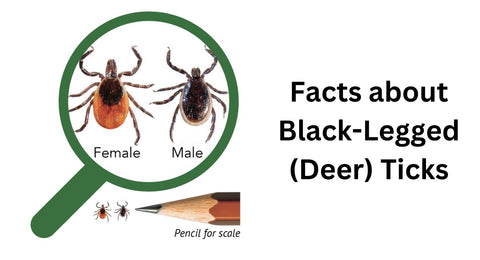Ticks pose a significant threat to our furry companions, potentially leading to various pet illnesses, some of which may even result in fatalities. The danger doesn't stem from a single source; multiple culprits contribute to these health concerns. Among these is the Black-legged tick, emerging as a potential carrier of numerous ailments affecting cats and dogs alike.
Discover a wealth of intriguing insights about these tenacious parasites, shedding light on their natural habitat, behaviors, and all the essential details you should be acquainted with regarding these formidable creatures.
Here are some interesting facts about this Black-Legged (Deer) Ticks
- The distinguishing feature of black-legged ticks lies in their name, as they are recognized for their ebony-hued legs and a pale body tinted in shades of orange-brown.
- These tiny arachnids have earned the moniker "deer ticks" due to their strong preference for feeding on white-tailed deer, which is their most frequent host.
- Black-legged ticks seek refuge amidst shrubbery and grass as they await unsuspecting passersby. In contrast to their Lone Star tick counterparts, they don't actively advance toward their intended host; instead, they rely on their tenacity to cling to hosts that come into direct contact with them.
- These diminutive ticks have the potential to harbor bacteria that play a pivotal role in the development of canine ailments such as Anaplasmosis, Lyme disease, Rocky Mountain Spotted Fever, and Babesiosis.
- Black-legged ticks are notably prevalent in the Northeastern United States but are also frequently encountered in various other regions.
- The symptoms associated with illnesses transmitted by black-legged ticks typically resemble those of the flu, and in some instances, they can be challenging to diagnose accurately.
- These ticks commonly inhabit shaded, woody environments, often seeking refuge beneath layers of fallen leaves and foliage.
- Black-legged ticks have a leisurely dining pace, as it takes them nearly five days to finish a meal.
- In the eastern United States, Lyme disease can be attributed to the transmission of the disease by black-legged ticks.
- Black-legged ticks have a lifespan of approximately 2-3 years, and a significant portion of their existence is spent within their natural environment rather than on a host.
- For disease transmission to occur, it typically requires a window of 24-48 hours following the attachment of a black-legged tick.
- After embedding their heads into the host's skin, these ticks nourish themselves by feeding on their blood.
- Lyme disease is also a concern for humans, who can contract it following a bite from an infected deer tick.
- Lyme disease has the potential to lie dormant within the body for extended periods. Over time, it can lead to neurological problems, such as memory loss, as well as severe skin issues.
- These ticks are drawn to the carbon dioxide emitted by pets, making them particularly attracted to our furry companions.
Some Tick Facts
- Like their distant cousins, spiders, and scorpions, ticks belong to the arachnid family.
- While hard ticks typically inhabit wooded areas, soft ticks tend to make their homes in caves or on birds.
- Ticks can have a surprisingly lengthy lifespan, extending up to 200 days.
- Their life cycle encompasses four distinct stages: eggs, larvae, nymphs, and adults.
- The cocooned nymph stage of a tick displays remarkable resilience, allowing it to endure adverse weather conditions.
- When it comes to tick removal, it's crucial to use tweezers to prevent breaking the tick's body, leaving its head embedded in the host's skin. Alternatively, you can explore pain-free tick removal solutions, such as Bravecto.
- Ticks are a year-round concern, necessitating continuous preventative measures to safeguard dogs and cats from these persistent parasites.







